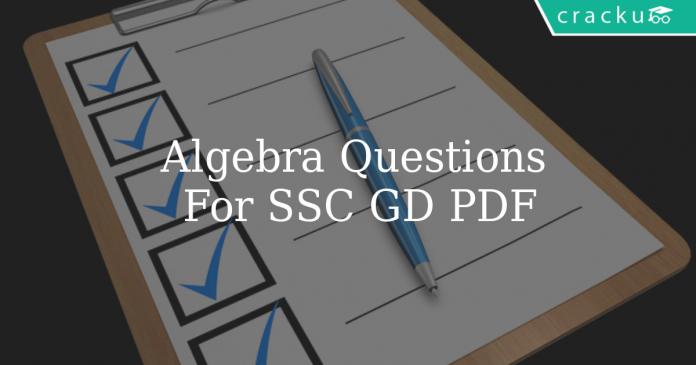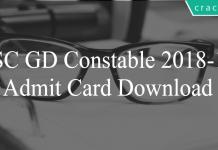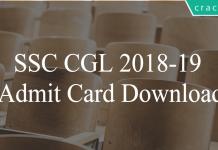Algebra Questions For SSC GD PDF
SSC GD Constable Algebra Question paper with answers download PDF based on SSC GD exam previous papers. 40 Very important Algebra questions for GD Constable.
ALGEBRA QUESTIONS FOR SSC GD PDF
GET 20 SSC GD MOCK FOR JUST RS. 117
Download SSC GD Important Questions PDF
1500+ Must Solve Questions for SSC Exams (Question bank)
Question 1: Find the number of even factors of 15680.
a) 42
b) 21
c) 36
d) 24
Question 2: Find the number of prime factors of 14560
a) 3
b) 4
c) 5
d) 6
Question 3: What is the square root of 97-16$\sqrt{3}$
a) 9-4$\sqrt{3}$
b) 9+4$\sqrt{3}$
c) 7-4$\sqrt{3}$
d) 7+4$\sqrt{3}$
Question 4: Find the value of $\Large\frac{\frac{1}{3}.\frac{1}{3}.\frac{1}{3}+\frac{1}{4}.\frac{1}{4}.\frac{1}{4}+\frac{1}{9}.\frac{1}{9}.\frac{1}{9}-3.\frac{1}{3}.\frac{1}{4}.\frac{1}{9}}{\frac{1}{3}.\frac{1}{3}+\frac{1}{4}.\frac{1}{4}+\frac{1}{9}.\frac{1}{9}-(\frac{1}{3}.\frac{1}{4}+\frac{1}{4}.\frac{1}{9}+\frac{1}{3}.\frac{1}{9})}$
a) $\large\frac{25}{36}$
b) $\large\frac{19}{36}$
c) $\large\frac{24}{35}$
d) $\large\frac{17}{26}$
Question 5: Find the value of $\Large\frac{\frac{1}{2}.\frac{1}{2}.\frac{1}{2}+\frac{1}{4}.\frac{1}{4}.\frac{1}{4}+\frac{1}{5}.\frac{1}{5}.\frac{1}{5}-3.\frac{1}{2}.\frac{1}{4}.\frac{1}{5}}{\frac{1}{2}.\frac{1}{2}+\frac{1}{4}.\frac{1}{4}+\frac{1}{5}.\frac{1}{5}-(\frac{1}{2}.\frac{1}{4}+\frac{1}{4}.\frac{1}{5}+\frac{1}{2}.\frac{1}{5})}$
a) $\large\frac{17}{20}$
b) $\large\frac{19}{20}$
c) $\large\frac{13}{20}$
d) $\large\frac{11}{20}$
Download SSC GD FREE PREVIOUS PAPERS
Question 6: The lines 2x+y = 3 and x+2y = 3 intersect at points
a) (1,1)
b) (-1,5)
c) (0,3)
d) (3,-3)
Question 7: If If $(3^{x})(3^y) = 9$ and $(5^{x})(125^y) = 625$, then find (x,y)
a) (4,-2)
b) (0,2)
c) (1,1)
d) (6,-4)
Question 8: If $(2^{x})(2^y) = 16$ and $(3^{x})(9^y) = 27$, then find (x,y)
a) (4,0)
b) (3,2)
c) (5,-1)
d) (6,-2)
Question 9: If a = 17, b = -4, c = -13, then find the value of $\large\frac{3a^{3}+3b^{3}+3c^{3}}{4abc}$
a) 3
b) $\frac{3}{4}$
c) 1
d) $\frac{9}{4}$
Question 10: If a = 48, b = 16, c = -64, then find the value of $\large\frac{a^{3}+b^{3}+c^{3}}{abc}$
a) 176
b) 64
c) 3
d) 12
DOWNLOAD APP TO ACESS DIRECTLY ON MOBILE
Question 11: Find the value of $1+\Large\frac{1}{1-\frac{1}{1+\Large\frac{1}{1-\frac{1}{7}}}}$
a) $\Large\frac{15}{7}$
b) $\Large\frac{19}{8}$
c) $\Large\frac{20}{7}$
d) $\Large\frac{17}{8}$
Question 12: If $x-\large\frac{1}{x}$ $= 3$, then $x^{3}-\large\frac{1}{x^{3}}$ $=$ ?
a) 24
b) 28
c) 36
d) 42
Question 13: If $(a-b)^{2} = 16$ and $(a+b)^{2} = 36$, then find the value of $\frac{ab}{a+b}$
a) $\frac{5}{6}$
b) $\frac{8}{11}$
c) $\frac{6}{7}$
d) $\frac{7}{6}$
Question 14: If a+b = 5 and a-b = 1, Then find the value of ab
a) 4
b) 6
c) 8
d) 12
Question 15: If $3X+\large\frac{3}{X}$ $= 6$, then find the value of $X^{6}+\large\frac{1}{X^{6}}$
a) 4
b) 3
c) 9
d) 2
Download SSC GD Constable Syllabus PDF
Question 16: If $2X+\large\frac{2}{X}$ $= 6$, then find the value of $X^{5}+\large\frac{1}{X^{5}}$
a) 123
b) 121
c) 116
d) 107
Question 17: Find the value of $\sqrt{56-\sqrt{56-\sqrt{56-……}}}$
a) 9
b) 8
c) 11
d) 14
Question 18: Find the value of $\sqrt{20-\sqrt{20-\sqrt{20-……}}}$
a) 8
b) 4
c) 6
d) 10
Question 19: Find the value of $\sqrt{42+\sqrt{42+\sqrt{42+……}}}$
a) 11
b) 7
c) 6
d) 10
Question 20: Find the value of $\sqrt{30+\sqrt{30+\sqrt{30+……}}}$
a) 12
b) 15
c) 6
d) 18
Question 21: Find the value of $\sqrt{6+\sqrt{6+\sqrt{6+……}}}$
a) 9
b) 3
c) 27
d) 16
Question 22: Find the value of $\sqrt{7\sqrt{7\sqrt{7……}}}$
a) $\sqrt{7}$
b) 49
c) 7
d) 2.64
Question 23: Find the value of $\sqrt{4\sqrt{4\sqrt{4……}}}$
a) 4
b) 2
c) 16
d) 8
Question 24: Find the value of $\sqrt{3\sqrt{3\sqrt{3……}}}$
a) 9
b) 3
c) 27
d) 1.2
Question 25: Find the value of $1+\Large\frac{1}{1+\frac{1}{1+\frac{3}{2}}}$
a) $\large\frac{13}{5}$
b) $\large\frac{17}{6}$
c) $\large\frac{17}{5}$
d) $\frac{12}{7}$
Question 26: Find the value of $1+\Large\frac{1}{1+\frac{1}{1+\frac{1}{6}}}$
a) $\large\frac{17}{5}$
b) $\large\frac{19}{6}$
c) $\large\frac{20}{13}$
d) $\frac{17}{13}$
100+ Free GK Tests for SSC Exams
Question 27: Find the value of $1+\Large\frac{1}{1+\frac{1}{1+\frac{1}{2}}}$
a) $\large\frac{6}{5}$
b) $\large\frac{8}{5}$
c) $\large\frac{8}{7}$
d) $\frac{7}{6}$
Question 28: If $x+\large\frac{1}{x}$ $= 3$, then $x^{5}+\large\frac{1}{x^{5}}$ $=?$
a) 123
b) 121
c) 116
d) 107
Question 29: If $x+\large\frac{1}{x}$ $=2$, then find the value of $x^{6}+\large\frac{1}{x^{6}}$.
a) 2
b) 5
c) 8
d) 6
Question 30: If $x+\large\frac{1}{x}$ $=4$, then find the value of $x^{3}+\large\frac{1}{x^{3}}$.
a) 48
b) 56
c) 52
d) 64
Question 31: If $x+\large\frac{1}{x}$ $=3$, then find the value of $x^{2}+\large\frac{1}{x^{2}}$.
a) 6
b) 7
c) 9
d) 8
Question 32: What is the units digit of $17^{17}$ *$33^{33}$
a) 7
b) 9
c) 3
d) 1
Question 33: What is the units digit of $27^{27}$ ?
a) 7
b) 9
c) 3
d) 1
Question 34: If $x+\frac{1}{x}=-2$ then the value of $x^{p}+x^{q}$ is: (Where p is an even number and q is an odd number)
a) -2
b) 2
c) 1
d) 0
Question 35: If $p(x+y)^{2}=5$ and $q(x-y)^{2}=3$, then the simplified value of $p^{2}(x+y)^{2}+4\ pq\ xy – q^{2}(x-y)^{2}$ is:
a) $- (p + q)$
b) $2 (p + q)$
c) $p + q$
d) $-2 (p + q)$
Question 36: The simplified value of the following expression is: $\frac{1}{\sqrt{11-2\sqrt{30}}}-\frac{3}{\sqrt{7-2\sqrt{10}}}-\frac{4}{\sqrt{8+4\sqrt{3}}}$
a) $0$
b) $1$
c) $\sqrt{2}$
d) $\sqrt{3}$
Question 37: The value of the following is: $\sqrt{12+\sqrt{12+\sqrt{12+…..}}}$
a) $2\sqrt{2}$
b) $2\sqrt{3}$
c) $2$
d) $4$
Question 38: The value of x in the following equation is:
$0.\dot{3}+0.\dot{6}+0.\dot{7}+0.\dot{8}=x$
a) $5.3$
b) $2\frac{3}{10}$
c) $2\frac{2}{3}$
d) $2.\dot{35}$
Question 39: If $1^{2}+2^{2}+3^{2}+……..+p^{2}$ = $\frac{p(p+1)(2p+1)}{6}$, then $1^{2}+3^{2}+5^{2}+……..+17^{2}$ is equal to:
a) 1785
b) 1700
c) 980
d) 969
Question 40: Given $2^{2}+4^{2}+6^{2}+……..+40^{2} = 11480$, then the value of $1^{2}+2^{2}+3^{2}+……..+20^{2}$ is:
a) 2870
b) 2868
c) 2867
d) 2869
Answers & Solutions:
1) Answer (C)
We have to factorise the number into prime factors i.e
15680=$2^{6}*5*7^{2}$
No of even factors =6*(1+1)*(2+1)
=36
2) Answer (B)
We have to factorise the number into prime factors i.e
14560=$2^{5}*5*13*7$
There are 4 different prime factors namely 2,5,7 and 13.
3) Answer (C)
we have $(a-b)^{2}$=$a^{2}+b^{2}-2ab$
Comparing this with 97-56$\sqrt{3}$=$a^{2}+b^{2}-2ab$
We have 97=$a^{2}+b^{2}$
For a=7 and b=4$\sqrt{3}$ it gets satisfied and also 2ab=2*7*4$\sqrt{3}$
So the $(7-4\sqrt{3})^{2}$=$7^{2}+(4\sqrt{3})^{2}-2*7*4*\sqrt{3}$
And so required answer is 7-4$\sqrt{3}$
4) Answer (A)
The given equation is in the form of
$\large\frac{a^3+b^3+c^3-3abc}{a^2+b^2+c^2-(ab+bc+ca)}$
We know that $a^3+b^3+c^3-3abc = (a+b+c)(a^2+b^2+c^2-(ab+bc+ca))$
=> $\frac{a^3+b^3+c^3-3abc}{a^2+b^2+c^2-(ab+bc+ca)} = a+b+c$
Then, $\Large\frac{\frac{1}{3}.\frac{1}{3}.\frac{1}{3}+\frac{1}{4}.\frac{1}{4}.\frac{1}{4}+\frac{1}{9}.\frac{1}{9}.\frac{1}{9}-3.\frac{1}{3}.\frac{1}{4}.\frac{1}{9}}{\frac{1}{3}.\frac{1}{3}+\frac{1}{4}.\frac{1}{4}+\frac{1}{9}.\frac{1}{9}-(\frac{1}{3}.\frac{1}{4}+\frac{1}{4}.\frac{1}{9}+\frac{1}{3}.\frac{1}{9})}$ $= \large\frac{1}{3}+\frac{1}{4}+\frac{1}{9} = \frac{12+9+4}{36} = \frac{25}{36}$
5) Answer (B)
The given equation is in the form of
$\large\frac{a^3+b^3+c^3-3abc}{a^2+b^2+c^2-(ab+bc+ca)}$
We know that $a^3+b^3+c^3-3abc = (a+b+c)(a^2+b^2+c^2-(ab+bc+ca))$
=> $\frac{a^3+b^3+c^3-3abc}{a^2+b^2+c^2-(ab+bc+ca)} = a+b+c$
Then, $\Large\frac{\frac{1}{2}.\frac{1}{2}.\frac{1}{2}+\frac{1}{4}.\frac{1}{4}.\frac{1}{4}+\frac{1}{5}.\frac{1}{5}.\frac{1}{5}-3.\frac{1}{2}.\frac{1}{4}.\frac{1}{5}}{\frac{1}{2}.\frac{1}{2}+\frac{1}{4}.\frac{1}{4}+\frac{1}{5}.\frac{1}{5}-(\frac{1}{2}.\frac{1}{4}+\frac{1}{4}.\frac{1}{5}+\frac{1}{2}.\frac{1}{5})}$ $= \large\frac{1}{2}+\frac{1}{4}+\frac{1}{5} = \frac{10+5+4}{20} = \frac{19}{20}$
6) Answer (A)
Given 2x+y = 3 and x+2y = 3
Solving above equations,
We get x = 1 and y = 1.
Hence, the lines intersect at (1,1)
7) Answer (C)
Given $(3^{x})(3^y) = 9$
=> $3^{x+y} = 3^{2}$
=> x+y = 2 — (1)
$(5^{x})(125^y) = 625$
=> $(5^{x})((5^3)^y) = 5^4$
=> $(5^x)(5^3y) =5^4$
=> $5^x+3y = 5^4$
=> $x+3y = 4$ — (2)
Solving (1) and (2)
=> 2y = 2 => y = 1
Substituting y = 1 in (1) –> x = 1
Therefore, (x,y) = (1,1)
8) Answer (C)
Given $(2^{x})(2^y) = 16$
=> $2^{x+y} = 2^{4}$
=> x+y = 4 — (1)
$(3^{x})(9^y) = 27$
=> $(3^{x})((3^2)^y) = 3^3$
=> $(3^x)(3^2y) =3^3$
=> $3^x+2y = 3^3$
=> $x+2y = 3$ — (2)
Solving (1) and (2)
=> y = -1
Substituting y = -1 in (1) –> x = 5
Therefore, (x,y) = (5,-1)
9) Answer (D)
Given a = 17, b = -4, c = -13
Then a+b+c = 0.
We know that if a+b+c = 0, then $a^{3}+b^{3}+c^{3} = 3abc$
Then, $\large\frac{3a^{3}+3b^{3}+3c^{3}}{4abc}$ $= \large\frac{3(a^{3}+b^{3}+c^{3})}{4abc} = \frac{3(3abc)}{4abc} = \frac{9}{4}$
10) Answer (C)
Given a = 48, b = 16, c = -64
Then, a+b+c = 48+16-64 = 0
We know that if a+b+c = 0, then $a^{3}+b^{3}+c^{3} = 3abc$
Hence, $\large\frac{a^{3}+b^{3}+c^{3}}{abc} = \frac{3abc}{abc}$ $= 3$
11) Answer (C)
$1+\Large\frac{1}{1-\frac{1}{1+\Large\frac{1}{1-\frac{1}{7}}}}$ = $1+\Large\frac{1}{1-\frac{1}{1+\Large\frac{1}{\frac{6}{7}}}}$
= $1+\Large\frac{1}{1-\frac{1}{1+\Large\frac{7}{6}}}$
= $1+\Large\frac{1}{1-\frac{1}{\Large\frac{13}{6}}}$
= $1+\Large\frac{1}{1-\frac{6}{13}}$
= $1+\Large\frac{1}{\frac{7}{13}}$
= $1+\Large\frac{13}{7}$
= $\Large\frac{20}{7}$
12) Answer (C)
Given $x-\large\frac{1}{x}$ $= 3$
Cubing on both sides
$x^{3}-\large\frac{1}{x^{3}}$ $-3\timesx\times\large\frac{1}{x}$ $(x-\large\frac{1}{x})$ $= 27$
=> $x^{3}-\large\frac{1}{x^{3}}$ $-3\times3 = 27$
=> $x^{3}-\large\frac{1}{x^{3}}$ $-9 = 27$
=> $x^{3}-\large\frac{1}{x^{3}}$ $= 36$
13) Answer (A)
Given $(a-b)^{2} = 16$ and $(a+b)^{2} = 36$
$(a+b)^{2} = (a-b)^{2}+4ab$
$36 = 16+4ab$
=> $4ab = 20$
$ab = 5$
$(a+b)^{2} = 36$
=> $a+b = 6$
Hence, $\frac{ab}{a+b} = \frac{5}{6}$
14) Answer (B)
Given, a+b = 5
a-b = 1
Then, 2a = 6 ==> a = 3
Substituting a = 3 in above equation
==> b = 2
Hence, ab = 3*2 = 6
15) Answer (D)
Given $3X+\large\frac{3}{X}$ $= 6$
$\Rightarrow 3(X+\large\frac{1}{X})$ $= 6$
$\Rightarrow X+\large\frac{1}{X}$ $= 2$
Squaring on both sides
$(x+\large\frac{1}{x})^{2}$ $=4$
$\Rightarrow x^{2}+\large\frac{1}{x^{2}}$+$2\times x\times\large\frac{1}{x}$ $=4$
$\Rightarrow x^{2}+\large\frac{1}{x^{2}}$ $+2 = 4$
$\Rightarrow x^{2}+\large\frac{1}{x^{2}}$ $= 2$
Cubing on both sides
$(x^{2}+\large\frac{1}{x^{2}})^{3}$ $= 8$
$x^{6}+\large\frac{1}{6}$ $+3\times x^{2}\times\large\frac{1}{x^{2}}$ $\times(x^{2}+\large\frac{1}{x^{2}})$ $= 8$
$\Rightarrow x^{6}+\large\frac{1}{6}$ $+3\times2 = 8$
$\therefore x^{6}+\large\frac{1}{6}$ $= 8-6 = 2$
16) Answer (A)
Given $2X+\large\frac{2}{X}$ $= 6$
$\Rightarrow 2(X+\large\frac{1}{X})$ $= 6$
$\Rightarrow X+\large\frac{1}{X}$ $= 3$ –> (1)
Squaring (1) on both sides
$(x+\large\frac{1}{x})^{2}$ $= 9$
$\Rightarrow x^{2}+\large\frac{1}{x^{2}}$ $+2\times x\times\large\frac{1}{x}$ $= 9$
$\Rightarrow x^{2}+\large\frac{1}{x^{2}}$ $+2 = 9$
$\Rightarrow x^{2}+\large\frac{1}{x^{2}}$ $= 7$ –> (2)
Cubing (1) on both sides
$(x+\large\frac{1}{x})^{3}$ $= 27$
$\Rightarrow x^{3}+\large\frac{1}{x^{3}}$ $+3\times x\times\large\frac{1}{x}$ $\times(x+\large\frac{1}{x})$ $= 27$
$\Rightarrow x^{3}+\large\frac{1}{x^{3}}$ $+3\times3 = 27$
$\Rightarrow x^{3}+\large\frac{1}{x^{3}}$ $= 27-9 = 18$ –> (3)
Multiplying (2) and (3)
$x^{2}+\large\frac{1}{x^{2}}$ $\times x^{3}+\large\frac{1}{x^{3}}$ $= 18\times7$
$\Rightarrow x^{5}+\large\frac{1}{x^{5}}$ $+x^{2}\times\large\frac{1}{x^{3}}$ $+x^{3}\times\large\frac{1}{x^{2}}$ $= 126$
$\Rightarrow x^{5}+\large\frac{1}{x^{5}}$ $+x+\large\frac{1}{x}$ $= 126$
Substituting $x+\large\frac{1}{x}$ $= 3$ in above equation
$\Rightarrow x^{5}+\large\frac{1}{x^{5}}$ $+3 = 126$
$\Rightarrow x^{5}+\large\frac{1}{x^{5}}$ $= 123$
17) Answer (B)
Let $\sqrt{56-\sqrt{56-\sqrt{56-……}}}$ = X
Then, $\sqrt{56-X} = X$
Squaring on both sides,
$56-X = X^{2}$
⇒ $X^{2}+X-56 = 0$
⇒ $X^{2}-8X+7X-56 = 0$
⇒ $X(X-8)+7(X-8) = 0$
⇒ $(X-8)(X+7) = 0$
⇒ $X = 8$ or $X = -7$
Hence, Option B is correct answer.
18) Answer (B)
Let $\sqrt{20-\sqrt{20-\sqrt{20-……}}}$ = X
Then, $\sqrt{20-X} = X$
Squaring on both sides,
$20-X = X^{2}$
⇒ $X^{2}+X-20 = 0$
⇒ $X^{2}-4X+5X-20 = 0$
⇒ $X(X-4)+5(X-4) = 0$
⇒ $(X-4)(X+5) = 0$
⇒ $X = 4$ or $X = -5$
Hence, Option B is correct answer.
19) Answer (B)
Let $\sqrt{42+\sqrt{42+\sqrt{42+……}}}$ = X
Then, $\sqrt{42+X} = X$
Squaring on both sides,
$42+X = X^{2}$
⇒ $X^{2}-X-42 = 0$
⇒ $X^{2}-7X+6X-42 = 0$
⇒ $X(X-7)+6(X-7) = 0$
⇒ $(X-7)(X+6) = 0$
⇒ $X = 7$ or $X = -6$
X cannot be negative when all the terms are positive.
Hence, $X = 7$
20) Answer (C)
Let $\sqrt{30+\sqrt{30+\sqrt{30+……}}}$ = X
Then, $\sqrt{30+X} = X$
Squaring on both sides,
$30+X = X^{2}$
⇒ $X^{2}-X-30 = 0$
⇒ $X^{2}-6X+5X-30 = 0$
⇒ $X(X-6)+5(X-6) = 0$
⇒ $(X-6)(X+5) = 0$
⇒ $X = 6$ or $X = -5$
X cannot be negative when all the terms are positive.
Hence, $X = 6$
21) Answer (B)
Let $\sqrt{6+\sqrt{6+\sqrt{6+……}}}$ = X
Then, $\sqrt{6+X} = X$
Squaring on both sides,
$6+X = X^{2}$
⇒ $X^{2}-X-6 = 0$
⇒ $X^{2}-3X+2X-6 = 0$
⇒ $X(X-3)+2(X-3) = 0$
⇒ $(X-3)(X+2) = 0$
⇒ $X = 3$ or $X = -2$
X cannot be negative when all the terms are positive.
Hence, $X = 3$
22) Answer (C)
Let $\sqrt{7\sqrt{7\sqrt{7……}}}$ = X
Then, $\sqrt{7X} = X$
Squaring on both sides,
$7X = X^{2}$
⇒ X $= 7$
23) Answer (A)
Let $\sqrt{4\sqrt{4\sqrt{4……}}}$ = X
Then, $\sqrt{4X} = X$
Squaring on both sides,
$4X = X^{2}$
⇒ X $= 4$
24) Answer (B)
Let $\sqrt{3\sqrt{3\sqrt{3……}}}$ = X
Then, $\sqrt{3X} = X$
Squaring on both sides,
$3X = X^{2}$
⇒ X $= 3$
25) Answer (D)
$1+\Large\frac{1}{1+\frac{1}{1+\frac{3}{2}}}$ = $1+\Large\frac{1}{1+\frac{1}{\frac{5}{2}}}$
= $1+\Large\frac{1}{1+\frac{2}{5}}$
= $1+\Large\frac{1}{\frac{7}{5}}$
= $1+\Large\frac{5}{7}$
= $\large\frac{12}{7}$
26) Answer (C)
$1+\Large\frac{1}{1+\frac{1}{1+\frac{1}{6}}}$ = $1+\Large\frac{1}{1+\frac{1}{\frac{7}{6}}}$
= $1+\Large\frac{1}{1+\frac{6}{7}}$
= $1+\Large\frac{1}{\frac{13}{7}}$
= $1+\Large\frac{7}{13}$
= $\large\frac{20}{13}$
27) Answer (B)
$1+\Large\frac{1}{1+\frac{1}{1+\frac{1}{2}}}$ = $1+\Large\frac{1}{1+\frac{1}{\frac{3}{2}}}$
= $1+\Large\frac{1}{1+\frac{2}{3}}$
= $1+\Large\frac{1}{\frac{5}{3}}$
= $1+\Large\frac{3}{5}$
= $\large\frac{8}{5}$
28) Answer (A)
Given $x+\large\frac{1}{x}$ $= 3$ –> (1)
Squaring (1) on both sides
$(x+\large\frac{1}{x})^{2}$ $= 9$
$\Rightarrow x^{2}+\large\frac{1}{x^{2}}$ $+2\times x\times\large\frac{1}{x}$ $= 9$
$\Rightarrow x^{2}+\large\frac{1}{x^{2}}$ $+2 = 9$
$\Rightarrow x^{2}+\large\frac{1}{x^{2}}$ $= 7$ –> (2)
Cubing (1) on both sides
$(x+\large\frac{1}{x})^{3}$ $= 27$
$\Rightarrow x^{3}+\large\frac{1}{x^{3}}$ $+3\times x\times\large\frac{1}{x}$ $\times(x+\large\frac{1}{x})$ $= 27$
$\Rightarrow x^{3}+\large\frac{1}{x^{3}}$ $+3\times3 = 27$
$\Rightarrow x^{3}+\large\frac{1}{x^{3}}$ $= 27-9 = 18$ –> (3)
Multiplying (2) and (3)
$x^{2}+\large\frac{1}{x^{2}}$ $\times x^{3}+\large\frac{1}{x^{3}}$ $= 18\times7$
$\Rightarrow x^{5}+\large\frac{1}{x^{5}}$ $+x^{2}\times\large\frac{1}{x^{3}}$ $+x^{3}\times\large\frac{1}{x^{2}}$ $= 126$
$\Rightarrow x^{5}+\large\frac{1}{x^{5}}$ $+x+\large\frac{1}{x}$ $= 126$
Substituting $x+\large\frac{1}{x}$ $= 3$ in above equation
$\Rightarrow x^{5}+\large\frac{1}{x^{5}}$ $+3 = 126$
$\Rightarrow x^{5}+\large\frac{1}{x^{5}}$ $= 123$
29) Answer (A)
Given $x+\large\frac{1}{x}$ $=2$
Squaring on both sides
$(x+\large\frac{1}{x})^{2}$ $=4$
$\Rightarrow x^{2}+\large\frac{1}{x^{2}}$+ $2\times x\times\large\frac{1}{x}$ $=4$
$\Rightarrow x^{2}+\large\frac{1}{x^{2}}$ $+2 = 4$
$\Rightarrow x^{2}+\large\frac{1}{x^{2}}$ $= 2$
Cubing on both sides
$(x^{2}+\large\frac{1}{x^{2}})^{3}$ $= 8$
$x^{6}+\large\frac{1}{6}$ $+3\times x^{2}\times\large\frac{1}{x^{2}}$ $\times(x^{2}+\large\frac{1}{x^{2}})$ $= 8$
$\Rightarrow x^{6}+\large\frac{1}{6}$ $+3\times2 = 8$
$\therefore x^{6}+\large\frac{1}{6}$ $= 8-6 = 2$
30) Answer (C)
Given $x+\large\frac{1}{x}$ $=4$
Cubing on both sides
$(x+\large\frac{1}{x})^{3}$ $=64$
$\Rightarrow x^{3}+\large\frac{1}{x^{3}}$+ $3\times x\times\large\frac{1}{x}\times(x+\frac{1}{x})$ $= 64$
$\Rightarrow x^{3}+\large\frac{1}{x^{3}}$ $+3\times4 = 64$
$\Rightarrow x^{3}+\large\frac{1}{x^{3}}$ $+12$ $= 64$
$\therefore$ $x^{3}+\large\frac{1}{x^{3}}$ $= 52$
31) Answer (B)
Given $x+\large\frac{1}{x}$ $=3$
Squaring on both sides
$(x+\large\frac{1}{x})^{2}$ $=9$
$\Rightarrow x^{2}+\large\frac{1}{x^{2}}$+ $2\times x\times\large\frac{1}{x}$ $=9$
$\Rightarrow x^{2}+\large\frac{1}{x^{2}}$ $+2 = 9$
$\Rightarrow x^{2}+\frac{1}{x^{2}} = 7$
32) Answer (D)
In the power cycle of 7 we get units digit for
$7^{1}=7$
$7^{2}=49$
$7^{3}=243$
$7^{4}=1701$
And this cycle repeats. Cyclicity =4
$17^{4(4)+1}$ has 7 as its unit digit.
In the power cycle of 3 we get units digit for
$3^{1}=3$
$3^{2}=9$
$3^{3}=27$
$3^{4}=81$
And this cycle repeats. Cyclicity =4
$33^{8(4)+1}$ has 3 as its unit digit.
So the product of 7 and 3 is 21 and so the units digit is 1.
33) Answer (C)
In the cycle of 7 power we get
$7^{1}=7$
$7^{2}=49$
$7^{3}=243$
$7^{4}=1701$
And this cycle repeats. Cyclicity =4
$27^{4(6)+3}$ has 3 as its unit digit.
34) Answer (D)
Given : $x+\frac{1}{x}=-2$
=> $\frac{x^2+1}{x}=-2$
=> $x^2+1+2x=0$
=> $(x+1)^2=0$
=> $x+1=0$
=> $x=-1$
$\therefore$ $x^{p}+x^{q}$ (let $p=2$ and $q=1$)
=> $(-1)^2+(-1)^1=1-1=0$
=> Ans – (D)
35) Answer (B)
36) Answer (A)
Using, $a^2+b^2+ab=(a+b)^2$
=> $\sqrt{11-2\sqrt{30}}=\sqrt{(\sqrt6)^2+(\sqrt5)^2-2\sqrt6\sqrt5}=(\sqrt6-\sqrt5)$
Similarly, $\sqrt{7-2\sqrt{10}}=(\sqrt5-\sqrt2)$
and $\sqrt{8+4\sqrt3}=\sqrt{8+2\sqrt{12}}=(\sqrt6+\sqrt2)$
To find : $\frac{1}{\sqrt{11-2\sqrt{30}}}-\frac{3}{\sqrt{7-2\sqrt{10}}}-\frac{4}{\sqrt{8+4\sqrt{3}}}$
= $\frac{1}{(\sqrt6-\sqrt5)}-\frac{3}{(\sqrt5-\sqrt2)}-\frac{4}{(\sqrt6+\sqrt2)}$
Rationalizing the denominator, we get :
= $[\frac{1}{\sqrt6-\sqrt5}\times\frac{\sqrt6+\sqrt5}{\sqrt6+\sqrt5}]-[\frac{3}{\sqrt5-\sqrt2}\times\frac{\sqrt5+\sqrt2}{\sqrt5+\sqrt2}]-[\frac{4}{\sqrt6+\sqrt2}\times\frac{\sqrt6-\sqrt2}{\sqrt6-\sqrt2}]$
= $(\sqrt6+\sqrt5)-(\sqrt5+\sqrt2)-(\sqrt6-\sqrt2)$
= $0$
=> Ans – (A)
37) Answer (D)
Let $x=\sqrt{12+\sqrt{12+\sqrt{12+…..}}}$
=> $x=\sqrt{12+x}$
Squaring both sides, we get :
=> $x^2=x+12$
=> $x^2-x-12=0$
=> $x^2-4x+3x-12=0$
=> $x(x-4)+3(x-4)=0$
=> $(x-4)(x+3)=0$
=> $x=4,-3$
$\because x$ cannot be negative, => $x=4$
=> Ans – (D)
38) Answer (C)
39) Answer (D)
Expression : $1^{2}+3^{2}+5^{2}+……..+17^{2}$
= $[1^{2}+2^{2}+3^{2}+4^{2}……..+16^{2}+17^{2}]$ $-[2^2+4^2+………+16^2]$
= $[1^{2}+2^{2}+3^{2}+4^{2}……..+16^{2}+17^{2}]$ $-(2^2)[1^2+2^2+3^2………+8^2]$
= $[\frac{17(17+1)+(34+1)}{6}]-[4\times\frac{8(8+1)(16+1)}{6}]$
= $[\frac{17(17+1)+(34+1)}{6}]-[4\times\frac{8(8+1)(16+1)}{6}]$
= $[51\times35]-[48\times17]$
= $17\times(105-48)=969$
=> Ans – (D)
40) Answer (A)
Given : $2^{2}+4^{2}+6^{2}+……..+40^{2} = 11480$
=> $2^2[1+2^2+3^2+…..+20^2]=11480$
=> $1^{2}+2^{2}+3^{2}+……..+20^{2}=\frac{11480}{4}$
=> $1^{2}+2^{2}+3^{2}+……..+20^{2}=2870$
=> Ans – (A)
Download SSC GD Previous Papers PDF
DOWNLOAD APP FOR SSC FREE MOCKS
We hope this Algebra questions for SSC GD will be highly useful for your preparation.





